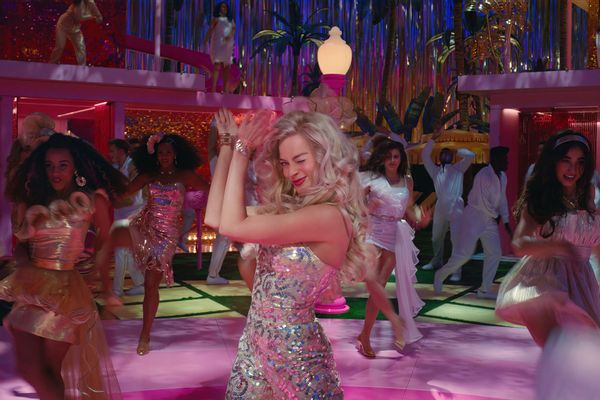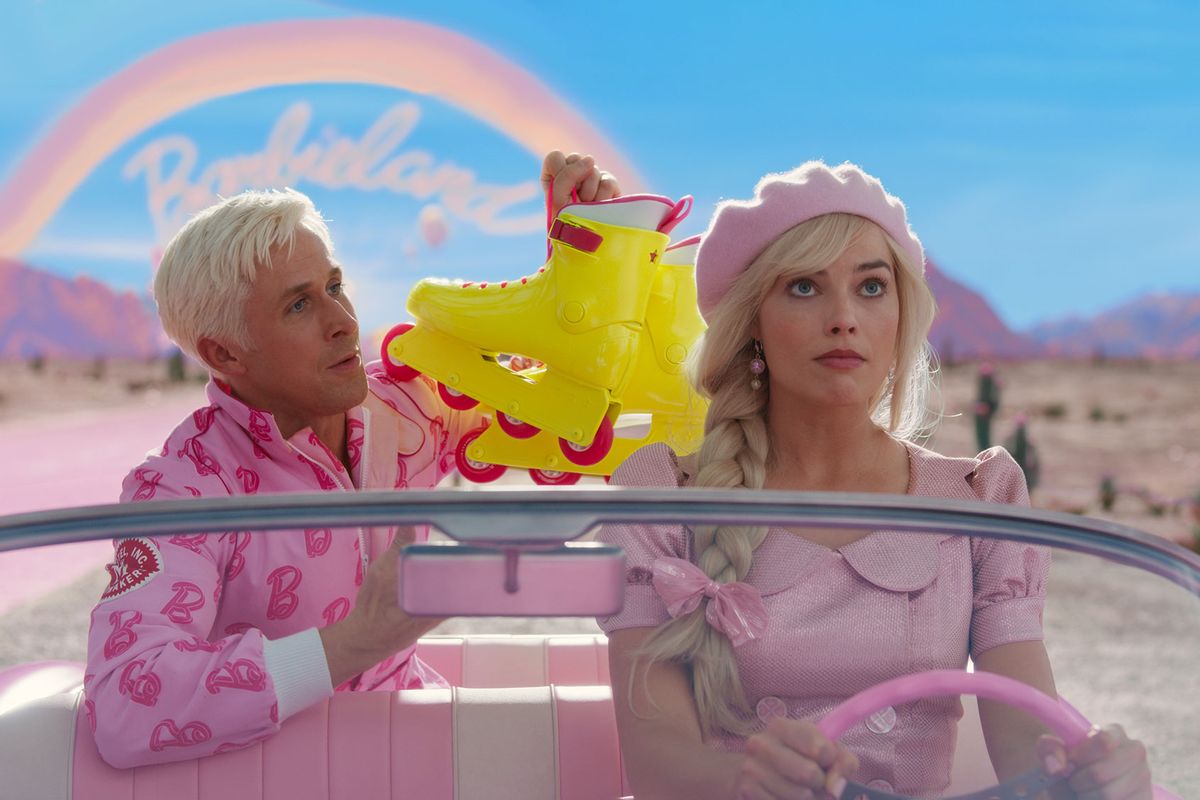Director Greta Gerwig's film "Barbie," based on titular the Mattel doll (Margot Robbie), is an overstimulating riot of eye-popping, neon-colored costumes and sets. The world-building is simply fabulous, with imaginative designs that incorporate many of the doll's accessories, dream houses, and more.
But why is a film called "Barbie" somehow all about Ken (Ryan Gosling)? For a story about female empowerment, it is vexing that Ken's neediness, loneliness and identity crisis hijack the plot for long stretches and force Barbie to help him, not the reverse. It feels disrespectful that she is so subservient because the film emphasizes the message that Barbie the doll inspired legions of women to go, be and do whatever they wanted — because "anything is possible." "Barbie" states its message often, but at times, it feels more mechanical, like a doll talking, than motivational.
The film opens with a cute, if corny, "2001" homage that is an origin story narrated by Helen Mirren, in which young girls reject "baby" dolls and admiring Barbie, an "adult" doll embodied by the oversized Margot Robbie in a stunning one-piece swimsuit that shows off her long, glamorous legs and dazzling smile. She is irresistible and perfectly cast. And when she winks, it is, indeed, magical.
The film then immerses viewers in Barbieland, a diverse and inclusive world full of BIPOC, trans and full-figured actresses playing Barbies who are all governed by a Black Female Barbie President (Issa Rae). It is a place where feminism and equal rights allow women to live their Best Day every day. (Ah, the fantasy!) And Gerwig shows viewers what that great day is like. Barbie gets up, takes a shower, makes breakfast, goes to the beach where she has dozens of friends and then dances at a party before having a girls' night.
For Ken, a great day is "if Barbie looks at him," suggesting he needs a woman's approval. The film also has Ken (Gosling) "beaching off" with another Ken (Simu Liu) in what one might call a d**k-measuring contest — if the Kens were anatomically correct. (They're not). Barbie has to break up their dumb fight. A big musical number/dance party follows, which is kind of fun, until Barbie ruins it by asking, "Do you guys ever thinks about dying?"
The next day, Barbie's shower is cold, her breakfast is burnt, and her great day is ruined by her existential crisis featuring inexplicable thoughts of death, evidence of cellulite and — worst of all — flat feet. To address her "malfunction," Barbie visits the misfit toy, "Weird Barbie" (Kate McKinnon, in a scene-stealing performance full of verve.). Weird Barbie explains Barbie has encountered a break in the portal between Barbieland and the Real World, and she must go to Los Angeles, and find the human who is "playing with her" to right things.
The trip to the Real World is great fun — the film does have moments of inventiveness — with various Barbie fashions and props from cars and boats to campers and skimobiles. The artificial vignettes are almost enough to make Wes Anderson jealous.
But once in L.A. the film slackens. Barbie and Ken get arrested, but they do get some fabulous outfits: a pink jumpsuit for her; a cowboy style fringe getup for him. However, Barbie's mood really sours when she encounters the preteen, Sasha (Ariana Greenblatt), who calls Barbie a "fascist" and tells her that she makes "women feel bad about themselves." It makes Barbie cry, and Robbie, who has perfected Barbie's vapid look, gives this tear the same momentous energy she did in "Babylon." It is nice that the film addresses this feminist critique, but then it spins off in a different direction, tracking Ken as he learns about the patriarchy in a sequence that goes on far too long.
Moreover, there is a subplot involving Mattel's all-male and mostly white board, whose CEO (Will Farrell, unfunny) trying to get Barbie "back in the box" to avoid the catastrophic situation of her (and Ken) being in the real world.
 Margot Robbie as Barbie in "Barbie" (Courtesy of Warner Bros. Pictures)The film's theme of resisting the subjugation of women is admirable, and Gerwig plays it with a mix of playfulness and earnestness, which is fitting for a film about a doll that allows young and old to imagine the world they want, while being in the world they are in. But the film stumbles a bit here as "Barbie" gets a bit silly with a manic chase scene. It recovers when Barbie encounters Ruth (Rhea Perlman), who helps her escape. Barbie also meets Gloria (America Ferrara), who is with her daughter Sasha, and the three of them go back to Barbieland, which it turns out, is now ruled by Ken who lives in a Mojo Dojo Casa House and has introduced the patriarchy, turning all the Barbies into docile, brainwashed women who serve men and have no independent thoughts.
Margot Robbie as Barbie in "Barbie" (Courtesy of Warner Bros. Pictures)The film's theme of resisting the subjugation of women is admirable, and Gerwig plays it with a mix of playfulness and earnestness, which is fitting for a film about a doll that allows young and old to imagine the world they want, while being in the world they are in. But the film stumbles a bit here as "Barbie" gets a bit silly with a manic chase scene. It recovers when Barbie encounters Ruth (Rhea Perlman), who helps her escape. Barbie also meets Gloria (America Ferrara), who is with her daughter Sasha, and the three of them go back to Barbieland, which it turns out, is now ruled by Ken who lives in a Mojo Dojo Casa House and has introduced the patriarchy, turning all the Barbies into docile, brainwashed women who serve men and have no independent thoughts.
"Barbie" uses this conceit of reversing gender roles to mock women's place in society, and set up a fantastic, applause-inducing speech by Gloria (Ferrera nails it) about how women must grin and bear life, like wanting things, but also being grateful for what they have or be a boss but not so tough that they are difficult to work with, etc. This rant galvanizes the Barbies to take back their power, and the film hits it stride in these moments.
But then it doesn't. Ken feels slighted about his patriarchy crumbling, and Barbie has to woman-splain things to him. What is infuriating is that she even apologizes for not wanting to be or live with him. For all the female agency on display, Barbie still has to placate and mollycoddle the insecure Ken. This is, sort of, Gloria's speech in action, and that is either wonderfully subversive and satiric or just plain stupid. Gerwig, lets viewers decide.
We need your help to stay independent
The film offers other mixed messages such as Sasha doing a 180 and being completely on board with Barbie, forgetting all her earlier contempt. It is another voice speaking truth to power being silenced. How is that letting young women "go, be and do whatever they want?"
Robbie charms in the title role, and her moments of despair display her comic timing. But the film is weakest when she is off screen. Ken gets a big, hyper-extended showstopping musical number that audiences will eat up — but again, it feels like he is stealing Barbie's thunder. Gosling's performance is mostly intense, as he is the villain of the piece, but he should be dumber and funnier. There is also a running joke featuring Allan (Michael Cera) who is not a Ken, and not a multiple, but it does not serve much purpose, or provide much humor.
There are some bright moments, as when Barbie meets the discontinued Barbies, which provide a chuckle at their bad design. (One has a TV in her back. Her back! Why!?) The film's other glimmer of wit comes from Mirren's voiceover when Robbie's beauty is questioned.
Gerwig ends her film with some answers to Barbie's existential crisis that involves her coming to terms with being "good enough." Gerwig's film is "good enough," but in a perfect Barbie world, it would have been better, and made Ken a sidekick, not a co-star.
"Barbie" is in theaters Friday, July 21.



Shares